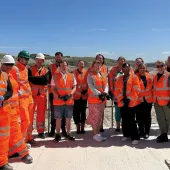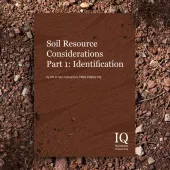Annual Conference 2011 Review

Improving energy efficiency and reducing operational costs
This year’s Institute of Quarrying annual conference proved to be yet another success with more than 100 delegates attending the event, which was held at the Chesford Grange Hotel, near Kenilworth in Warwickshire, on 11 October.
The theme of the symposium – ‘Energy Management and Cost-Saving Initiatives’ – created a highly informative and thought-provoking programme, with a number of high-profile speakers contributing to the debate including: Greg Elliott, director of business development at US-based IPS Group; Ian Fox, partnership manager at npower; Steffan Eldred, energy and best- practice manager for Tarmac; and Simon Higson, principal landscape architect for SLR Consultants.
A key challenge facing the quarrying industry is the need to supply aggregates in an environmentally friendly way and many businesses are aware of the need to reduce their energy consumption by assessing the carbon emissions used in the production and distribution of products.
Given the present economic climate, a stronger commitment to energy management in these difficult and challenging times is fast becoming a major consideration for many operators. The aim of the conference symposium was to promote, share and discuss various issues and developments in energy conservation and cost-saving initiatives.
The formal proceedings of the day began with a brief welcome and introduction by Martin Isles, President of the Institute of Quarrying, who said the challenges of operating in this environment have never been greater and any help in ways of reducing costs and improving efficiency should be welcomed.
This year’s keynote address given by Greg Elliott gave plenty of food for thought for delegates in terms of energy management. The current economic circumstances, he said, represented a unique opportunity for UK mineral products operators to be motivated for change. To achieve long-term, sustainable energy efficiency, Mr Elliott stressed the importance of having this business philosophy ingrained at all levels of a company, as ‘environmental sustainability’ involves change, vision and leadership.
Equally important, he argued, is the continuous performance monitoring of a quarry operation. According to Mr Elliott, measuring performance or having access to real-time data is key to finding out whether any investment in energy-efficiency practices has paid off, eg delivering energy cost savings for the operator.
As an alternative to the ‘Plan-Do-Check-Act’ four-step management method used in business, Mr Elliot recommended to delegates the consideration of the ‘Measure-Plan-Implement-Assess-Repeat/Adjust’ (MPIAR) approach for the control and continuous improvement of processes and products/services. He stressed the necessity of having accurate and reliable methods to measure energy consumption in order to equate it to a ‘unit consumption per unit production’ value.
Next to take the stage was Graeme Coyne, business manager at Siemens, who gave a talk on how having a carefully managed maintenance programme can result in significant cost savings for operators. Echoing Greg Elliott’s presentation, Mr Coyne spoke about the constant need for measuring performance and the effective implementation of systematic energy efficiency and cost-reduction programmes.
He argued that plant modifications, refurbishment and upgrades designed to reduce energy consumption and operational costs need to be fully justified. Using case studies from Siemens’ environmental portfolio, he showed how the company has improved plant availability by up to 5% and provided cost reductions of as much as 10% for clients across a range of industry sectors.
After the mid-morning coffee break, the arrangement of the conference symposium was split into two parallel sessions, with no less than 10 high-quality speakers presenting.
Among them were Jock Aitken, earthmover technical manager at Michelin, who spoke about energy savings through tyre innovations; Jonathan Hurley, business process manager at Volvo CE, who gave a presentation on the company’s environmental care activities; Mike Deakin, director of Proviso, who gave a talk on equipment condition monitoring in the extractives industry; and Dale Blundell, energy solutions consultant at Siemens, who discussed in detail some of the high-efficiency products (eg motors, gearboxes, lighting etc) available and the company’s energy services, including site audits and specific technology evaluations.
There was plenty more business-useful advice for delegates throughout the day. Hefin Jones, training and competency manager at Aggregates Industries, talked about the need for firms to build on the competence and operational best practice that has already been achieved in the industry.
He reminded everyone that training initiatives should not be focused solely on compliance with legislation but should also offer the best return on investment for businesses through a safety-conscious and competent-committed workforce. Mr Jones also brought people up to speed on how NVQs are being phased out and replaced by the new Qualification and Credit Framework (QCF).
After lunch, the main seminar proceedings resumed with presentations from James Dodds, director of Envireau Water; Simon Higson, principal landscape architect at SLR Consultants; and Peter Craven, marketing and sales support manager for CDE Global.
James Dodds spoke about adding value to restored mineral excavations by using a flooded quarry as a source of low-level energy, while Simon Higson’s talk focused on improving quarry sustainability by biodiversity offsetting, ie conservation activities intended to compensate for the residual, unavoidable harm to biodiversity caused by development projects.
Peter Craven highlighted the environmental advantages and substantial cost savings to be gained from recycled aggregates by showing delegates a short, informative video. He then went on to say that although the UK construction industry is currently the leading user of recycled and secondary materials in Europe, there is still a lot of work to be done in reducing waste to landfill and ensuring the whole supply chain recognizes the energy and economic impacts of waste disposal and recycling. And this is where sophisticated mineral processing equipment, such as CDE’s washing systems, can help quarry operators achieve their sustainability goals.
Continuing the theme of environmental responsibility, Steffan Eldred, energy and best-practice manager for Tarmac, gave an insight into the company’s sustained and strategic approach to energy management.
Reducing energy consumption is a key part of Tarmac’s business strategy and Mr Eldred explained how this corporate framework is helping the firm to develop and implement more efficient ways of saving energy, minimizing its carbon footprint and driving down operational costs.
Next to take the floor was Ian Lancaster, technical manager at Nynas UK AB, who discussed the benefits of binder grade correction by rejuvenation. He explained the limitations of recycling and reusing asphalt and warned that although binder rejuvenation is possible, there still needs to be more research conducted in this area.
Closing the plenary session, the final presentation of the day was by Ian Fox, partnership manager at npower, who urged the industry to continue to invest in energy management programmes. He touched on the renewable technologies available and discussed how investment in renewable energy sources, such as photovoltaic, wind power, ground-source heat pumps and biomass, can result in substantial savings in the long term.
He also reiterated the importance of continuous improvement in reducing energy usage and carbon emissions. Exemplifying npower’s energy-saving 3M approach – measure, monitor and minimize – he told delegates energy management is one of the most effective ways to lower energy bills and further reduce consumption.
The day’s proceedings were concluded by Martin Isles, followed by Anthony Morgan, former IQ Chairman, and Peter Barkwill, newly appointed IQ Chairman, who each chaired one of the seminar streams.
Anthony Morgan thanked all contributors to the conference and summarized the event as ‘stimulating, successful and thoroughly enjoyable’, while Peter Barkwill highlighted the importance of spreading the energy-efficiency message across the industry and the continuing investment in delivering ongoing improvements in energy performance.
Like health and safety, good energy management should never be compromised. It is increasingly becoming an essential factor for businesses in meeting government legislation and, from a commercial point of view, can help companies outperform in competitive markets.
Quarry Technology Diploma Examination Prize Winners 2011
Leonard Clugston (Average of all ten modules)
Prize Winner: Rhys Buckley (Hanson)
Reginald Coles Award (Health, Safety, Legislation & Practice)
Prize Winner: Ian Phillips (CEMEX)
Runner-up: Mark Grieve (Lafarge)
Peter Preston Award (Quarry Operations)
Prize Winner: Stewart Mclaren (Isle of Man Govt)
Runner up: Ian Phillips (CEMEX)
Ransomes Rapier Award (Quarry Engineering)
Prize Winner: Andrew Kells (SABIC - Saudia Arabia)
Runner-up: Trevor Moore (Kellys of Fantane)
Rexnord Award (Quarry Operations Blasting)
Prize Winner: Ben Dormer (AI)
Runner-up: Rhys Buckley (Hanson)
Goodwin Barsby Award (Construction Materials Testing)
Prize Winner: Trevor Moore (Kellys of Fantane)
Runner-up: Ben Dormer (AI)
Tilcon Award (Business Management)
Prize Winner: Rhys Buckley (Hanson)
Runner-up: Stewart Mclaren (Isle of Man Govt)
Springbank Quaich (Scottish IQ Branch)
Prize Winner: Mark Grieve (Lafarge)
Longcliffe Calcium Carbonates Awards of Excellence
Foundation Year (Average of three modules)
Prize Winner: John Pritchard (Sibelco)
Runner-up: Don Mclean (Breedon Scotland)
Certificate of the Year (Average of four modules)
Prize Winner: Arnold Marsden (Tarmac)
Runner-up: Jonathan Kent (Imerys)








